
I.
I was surprised to learn recently that it was common for men in western cultures[1] to hold hands throughout the 19th century, and that friendship for both men and women was generally valued much more highly than it is today, a time when people say things like “No New Friends” and this:
Contrast this to:
From the Civil War through the 1920′s, it was very common for male friends to visit a photographer’s studio together to have a portrait done as a memento of their love and loyalty. Sometimes the men would act out scenes; sometimes they’d simply sit side-by-side; sometimes they’d sit on each other’s laps or hold hands. The men’s very comfortable and familiar poses and body language might make the men look like gay lovers to the modern eye — and they could very well have been — but that was not the message they were sending at the time… Because homosexuality, even if thought of as a practice rather than an identity, was not something publicly expressed, these men were not knowingly outing themselves in these shots; their poses were common, and simply reflected the intimacy and intensity of male friendships at the time — none of these photos would have caused their contemporaries to bat an eye.
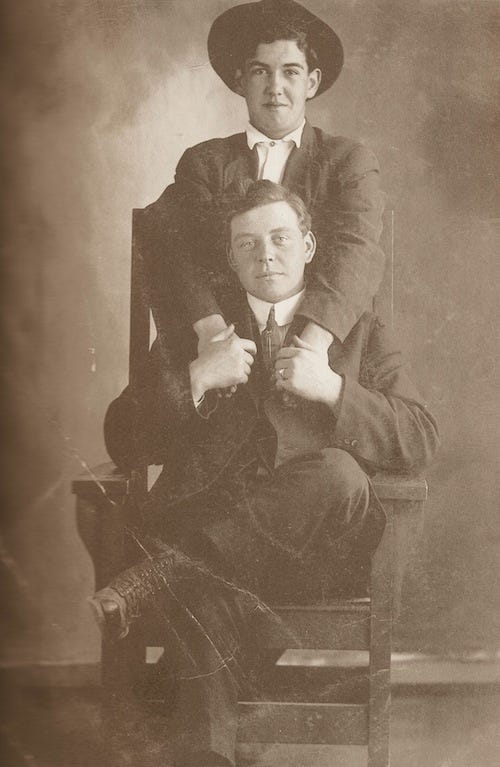
Photos of men with their wives, an often functional arrangement not rendered from romantic love, are often much less affectionate or loving. Women, too, thought of their best friends as more than what a husband could ever offer: loyal, supportive, sympathetic, clever, and funny. Same sex friendships were often considered the best relationships one had in life outside of one’s parents.
— “Men Holding Hands? Friendship in the 19th Century Was Quite Different”
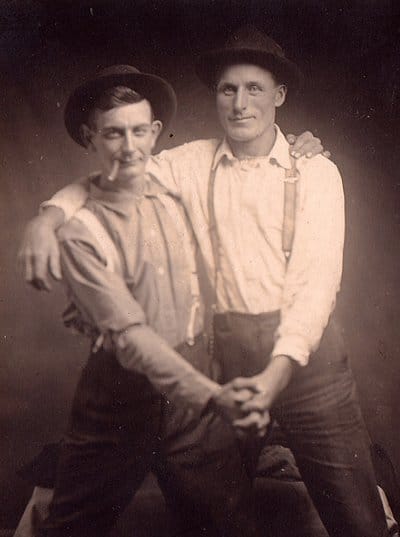
I’m not really sure why I was surprised that the friendship was regarded very different in the past—it seems obvious that romantic relationships have evolved considerably over time, for example. Maybe it’s just my personal ignorance (probably), but I have a suspicion that something deeper is going on here, a kind of blind spot that we have surrounding friendship, a under-appreciation for its importance in our lives that leads to a broader under-representation in the arts, politics, philosophy, and culture writ large.
For instance, how often do we reflect on the fact that 65% of children up to the age of 7 have imaginary friends (“There is little research about the concept of imaginary friends in children’s imaginations” according to Wikipedia,), or that adults, if desperate enough, will befriend inanimate objects such as volleyballs?

The dynamic of friendship is almost always underestimated as a constant force in human life. A diminishing circle of friends is the first terrible diagnostic of a life in deep trouble: of overwork, of too much emphasis on a professional identity, of forgetting who will be there when our armoured personalities run into the inevitable natural disasters and vulnerabilities found in even the most average existence.
I suppose there is no a priori expectation for how much romantically-themed art there should be relative to friendship-themed art, but it’s hard not feel like there is a paucity of the latter (how many popular friendship songs can you think of besides this masterpiece?). The paucity of friendship-themed work may be even greater in “serious” intellectual domains; as one example, there is effectively no discussion of friendship amongst effective altruists (google it or search the effective altruism forum to see what I mean; what discussion does exist focuses on friendship as a tool for community building within EA, not as something that EA should focus on promoting in and of itself). Is it not strange that a philosophical movement dedicated to rationally doing good almost completely ignores something which is universally regarded as one of life’s highest intrinsic goods, something that also happens to possess immense extrinsic value as a buffer against a variety of social ills (e.g. radicalization, crime/violence, physical and mental health issues, addiction, homelessness, etc.)?
I have a few hypotheses for why this blind spot exists in effective altruism/intellectual domains and the wider culture. First, effective altruism (and business and politics and education and…) likes legibility and friendship just isn’t a very legible thing. Is someone a BFF, a friend, or an acquaintance? How strongly would you rate your friendship on a scale of 1-100? Would they give a similar rating? Are you sure? Can you truly count on them to help you in your time of need?
Furthermore, it’s generally a bad idea to think too deeply or quantitatively about your friendships—a certain degree of irrationality and forgetfulness is essential to the whole enterprise. It’s usually not good for a friendship when you start thinking things like “Bob is kind of a shitty person, why exactly am I still buddies with him?” (because you’ve known him for a long time and he really got you out of jam back in college, and that’s plenty enough reason to stay friends with him; also people change and you might be really glad that you stayed friends with him in the future) or “Nancy has to initiate the next hang out because I’ve done it nine times this year compared to her three”(she’s going through some things you don’t know about so cut her a break, just like she’s cut you one in the past). Friendship drama caused by weddings is another example—shit can really get awkward when you have to basically rank your friends by choosing a best man/maid of honor or deciding who makes it into the wedding party and who doesn’t.
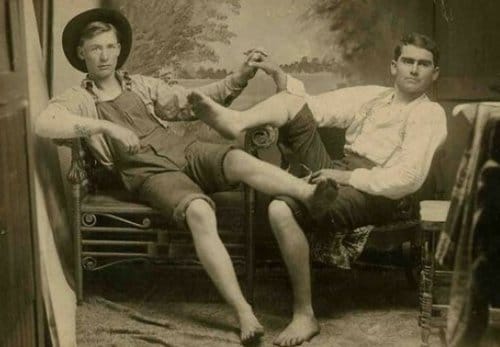
So perhaps this aversion towards over-scrutinizing our own personal relationships manifests on a collective level as a kind of cultural blind spot around friendship. I think there are is at least one more factor at play however, one which I previously highlighted as responsible for our intellectual bias against sports (see The Future: Where are the Colors and Sports?).
It comes down to what’s known as Construal-level Theory:
People are capable of thinking about the future, the past, remote locations, another person’s perspective, and counterfactual alternatives. Without denying the uniqueness of each process, it is proposed that they constitute different forms of traversing psychological distance. Psychological distance is egocentric: Its reference point is the self in the here and now, and the different ways in which an object might be removed from that point—in time, in space, in social distance, and in hypotheticality—constitute different distance dimensions. Transcending the self in the here and now entails mental construal, and the farther removed an object is from direct experience, the higher (more abstract) the level of construal of that object. (source)
So distance—whether spatial, temporal, social-emotional, or conceptual—causes us to think more abstractly and with less attention to detail. This is why we always picture the future as blue and black (because those are the colors of the sky which is very far away) and smooth and shiny (i.e. lacking in texture and imperfections), and why the future always seems so boring—it’s all epic battles between good and evil or far-flung space exploration and not a whole lot of sports or sex, drugs, and rock n’ roll (all of which are things I like to do with my friends, coincidentally).
Robin Hanson discusses it as far vs. near modes of thinking:
“In far mode we tend to focus more on our simple abstract ideals and values, relative to messy desires and practical constraints. We also tend to neglect our messy internal contradictions and conflicts, and therefore assume our values and actions are coherent and consistent…We assume future folk are less driven by base desires, more strongly committed to their ideals, less tolerant of domination, more morally enlightened, and more morally judgmental about others’ failings.” (Hanson)
All of this is to say: the totalizing/optimizing mindset (“doing the most good”) of EAs and other intellectual types predisposes them towards “far” things (like large-scale technocratic projects aimed at reducing the suffering of faceless future beings) over “near” things like friendship and sports.
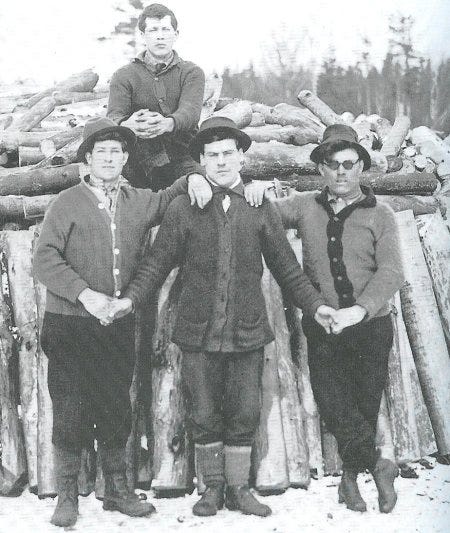
II.
I don’t know if I’m missing something and this isn’t as bad as it seems (I mean N=2,019, so there’s that), but it sure seems pretty fucking bad, like something that we should be super worried about and actively trying to remedy. I can’t for the life of me figure out why this isn’t seen as a serious social issue in the USA; do people not find it alarming that 32% of Americans have 0-2 friends? (I don’t know what the trends are in other developed countries but I would imagine they are heading in the same direction). Or do people just think this problem is intractable, that it is downstream of other larger technological/cultural issues? Or is it this blind spot I’ve been speaking of, this weird cultural hang-up we have around discussing friendship too openly (almost as if bringing it up makes you seem like a loser who has no friends)?
Maybe I’m overreacting here, but I would argue that now is precisely the time for us to start overreacting, because if we don’t have a “friendship crisis” now, then we sure as hell will have one in the near future.
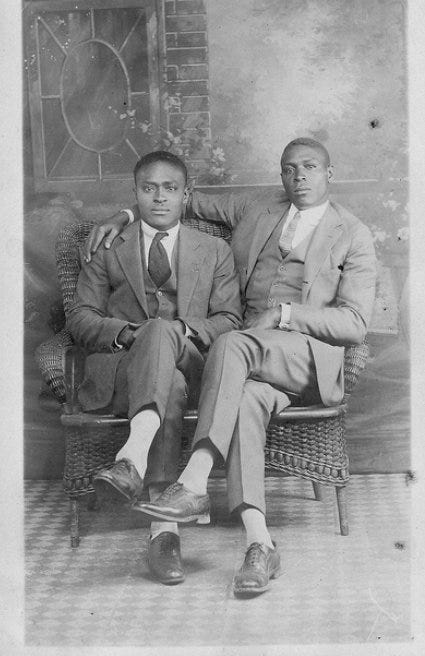
Falling birthrates and (and lower marriage rates) means that there will be a rising number of people with small or non-existent families in the coming decades. If we want friendship to provide more of the love and support that a family or romantic relationship typically does, then we should start making changes now because friendships, especially the deep ones that border on familial relationships, don’t happen overnight.
A second and more immediate cause of this budding “friendship crisis” is the rise of remote work. For all of the undeniable benefits of not having to schlep to the office every day, we are less likely to make friends when working remotely. This isn’t to say that remote work is bad for platonic companionship in general—some of the time and energy we save while working from home is devoted to maintaining existing friendships or developing new ones—but it does make us less likely to become friends with people very different from ourselves, people who we sometimes have almost nothing in common with except that we work together. How else would I, a born-and-raised American who has never lived abroad, make friends with a Belarusian immigrant (the physics teacher at the school where I formerly worked) and an Albanian-Italian immigrant 20 years my senior (the art teacher)? Uncommon friendships of this sort are incredibly valuable on societal level for obvious reasons (especially for a country as diverse as the USA), and if office work isn’t helping to create them as it once did then we need something new to fill the void.
III.
What then, if anything, can be done to encourage more friendship and raise its stature in our culture? Searching the effective altruism forum did yield the transcript of a talk from 2018 on something called the Friendship Bench, which is kind of a misnomer because it’s not really about friendship per se. In the talk, Dr. Dixon Chibanda discusses a mental health intervention that he designed and implemented in his home country of Zimbabwe.
And over a couple of months, we managed to come up with a meaningful sort of intervention, and over the years we developed a series of components to this intervention, which became known as the Friendship Bench, which in essence is psychological therapy which is delivered on a bench in the community by grandmothers. And one of our most recent publications is a clinical trial of this intervention, where we compared the Friendship Bench with usual care, through a cluster randomized controlled trial. And the cluster randomized controlled trial, which is published in the Journal of the American Medical Association actually showed that grandmothers were more effective at delivering and alleviating symptoms of depression and averting suicides than usual care.
From the Q&A:
Dixon: …And one of the other things which we also encourage on the Friendship Bench, which is really not in-keeping with your usual psychotherapy or CBT therapy is that the therapist becomes almost involved. And this is something that I was never trained to do as a psychiatrist, you know? You always keep your distance, but we’ve learned from the grandmothers that it’s critically important to show your weaknesses too as a human being, by sharing your own lived experience, but within a very structured way, and by doing that you really establish strong rapport with the client.
Question: It strikes me that this is also sort of an instruction manual for how to be a good friend.
Dixon: Well, that’s why it’s called the “Friendship Bench”!
The Friendship Bench sounds cool and all (I am 100% on board with any experiments/mental health interventions that incorporate grandmas), but I am more interested in the simple idea of having public spaces dedicated to friendship, especially ones where old and young can interact and form relationships.
“They’re really proving to be a win, win, win, very beneficial for both ages,” Donna Butts, the executive director of Generations United, a nonprofit that promotes intergenerational programs, policies, and strategies, told Insider. “With intergenerational programming, it helps older adults develop a sense of purpose. They’re giving back, they’re engaged, they’re stimulated by the interactions with younger people. And it also gives them hope for the future. For younger people, it really helps in terms of a sense of roots, history.”
Anything we can do to spread more grandmotherly (or grandfatherly) love and wisdom sounds good in my book—this is why I’m bullish on intergenerational housing programs (1, 2, 3) that give young people a break on rent if they live in retirement homes and contribute to the community.

Friendship benches and intergenerational housing are a nice start, but Let’s Not Stop There. I want friendship temples and an entire friendship religion, a first-of-its-kind belief system that doesn’t worship a god or some abstract metaphysical principle but a Divine Friendship, a bond between two perfect beings who become even more perfect through their free association with another, a simple companionship that makes an existence of infinite eternal bliss even more infinite and eternal and blissful (to be crystal clear about this: the deities themselves are not worshipped or even described in any particular detail, only the Divine Friendship is truly regarded sacred).
Epicurus will be our philosophical patron saint.
Epicurus placed an extremely high value on friendship (or love: philia). A saying with rather a more poetic flair than is Epicurus’ custom runs: “Friendship goes dancing round the world, announcing to all of us to wake up to happiness”. Epicurus held that a wise man would feel the torture of a friend no less than his own, and would die for a friend rather than betray him, for otherwise his own life would be confounded. These are powerfully altruistic sentiments for a philosopher who posits as the unique goal in life happiness based on freedom from physical pain and mental anxiety. Epicurus could justify such an attitude by the same prudential calculus that he uses to argue in favor of living justly: only by living in such a way that loyalty to friends is perceived to be a consummate value will one be able to feel secure in one’s friends, and thus maximize one’s felicity.
One important custom of the friendship religion regards the usage of philosophical thought experiments (The Drowning Child, trolley problems, etc.); all mentions of “people”, “children” and other general descriptors must be replaced by “friend”. Thus, we have The Drowning Friend, the fat friend whom you can push on to the tracks in order to save your other five friends, friends chained to the wall of Plato’s allegorical cave , and so on and so forth. This simple substitution changes nothing, but also everything.
Epicureans were encouraged to form communities and to observe certain rituals, although most of these practices, such as the celebration each month of the day (the 20th) on which Epicurus w no no noas born or wearing rings bearing an image of Epicurus, may have originated after the founder’s death.
This is the killer app of the religion: a monthly day of celebration dedicated to renewing one’s friendships and forging new ones (we can get dope friendship rings too though). I predict that this custom will quickly spread beyond the religion and become so popular that countries across the world will be forced to make the 20th of every month into a national holiday (a holy-day) as large swaths of their populations will simply refuse to work on these days anyways. For any world leaders reading this (no doubt there are many), why wait until the friendship religion becomes a thing? Stand on the right side of history (just think of how your approval rating will skyrocket!).
Returning to more practical matters (not to say that I’m being anything less than 100% serious about the friendship religion), I think we should also begin re-considering some of our laws around friendship. We should of course be very wary of over-legalizing our platonic relationships, but under-legalizing them can be problematic as well.
In 2012, Canada’s The Globe and Mail reported that the 73-year-old American companion of an 83-year-old Canadian woman had been deported from Canada despite their relationship of many years: ‘She and her friend of three decades, Ms. Sanford, 83, are inseparable. In addition, Ms. Sanford suffers from a heart condition and dementia and Ms. Inferrera looks after her.’ The American woman had been refused permanent residency in spite of numerous appeals, even though she performs extensive caregiving for her friend. The two women are not romantically involved. They are ‘just friends’. As such, their relationship, no matter how long-term or caring, received no legal protection. (In a happy turn of events, the Canadian government relented once the women’s plight was publicised.)
The quoted article raises an interesting question: why does marriage get special treatment when it comes to immigration?
It might be thought that long-term caring relationships need no special support or recognition. But in an array of contexts, such as immigration, caring relationships need state protection to enable the parties to play key roles in each other’s lives. Some such entitlements are currently only available through marriage, and while others can be contracted independently, this involves lawyer’s fees far in excess of the cost of the marriage license.
(Ibid)
You could even argue that friendship is much less problematic when it comes to immigration because it can’t be faked in quite the same way as a romantic relationship—there is no “love at first sight”. I feel much better about extending citizenship to someone’s long-time friend (assuming they can adequately document said friendship) than I do to some guy’s new (mail order) bride that he met three months ago on the internet.
Whether legalized or not, I would also like to see platonic life-partners become more of a thing: enduring non-sexual relationships in which two friends cohabitate, commingle finances, and support each other in all the ways a romantic partner would. For example:
Last fall Renee moved from Singapore to Los Angeles to be with her partner April. April calls it a grand gesture and it certainly is. But it was confusing to a lot of people because Renee and April aren’t in a romantic relationship. At all. And yet they do consider themselves life partners. The two women have been best friends since they were teenagers and they now consider themselves platonic life partners. But our society doesn’t really recognize that as a thing.
—show notes, the “Platonic Life Partners” episode of the Committed podcast
The friendship religion might play a role here similar to the role that other religions play in marriage: supplying friendship oaths or ceremonies that formalize and sacralize these platonic partnerships.
IV.
My fear with essays like this is that people will read them and think something like, “what a fun little essay filled with cute little ideas and arguments, perhaps I will ponder it again some time, or even bring it up in conversation one day”. There’s nothing wrong with that of course—we all do it all the time—but another response is possible, something like, “this was a work of divine inspiration, I will treat these words as gospel and reorient my entire life around their message”. I expect that most readers will fall somewhere in between these two extremes, perhaps tending slightly more towards the former over the latter (but maybe I’m wrong). For those chosen few who have been touched (lightly, lovingly) by this essay, I recommend that you take the following actions:
1) Create a friendship bench and find a grandmother to sit on it
2) Get together a bunch of your friends and build a friendship temple
3) Start a friendship religion, become a friendship priest
4) Make a commitment, right here and right now, at this very moment, to stop making excuses and simply become a better friend.
But no matter the medicinal virtues of being a true friend or sustaining a long, close relationship with another, the ultimate touchstone of friendship is not improvement, neither of the other nor of the self: the ultimate touchstone is witness, the privilege of having been seen by someone and the equal privilege of being granted the sight of the essence of another, to have walked with them and to have believed in them, and sometimes just to have accompanied them for however brief a span, on a journey impossible to accomplish alone.
—David Whyte
I have a few more not-at-all-outlandish proposals—train people in tulpamancy so that they can make imaginary friends for themselves if the need arises, genetically enhance dogs and parrots in order to make them into better friends (not cats, they do not like us and they are not our friends), something something deep learning something neural networks something something optimize friendship—but I will save those for part 2 (coming soon, or never).
This one is goes out to all the homies: Zachy aka Z baby aka DJ ZJD, Joey aka Brody aka Randy, Pat aka Pasta P aka Kirky aka Tracey Chrome, Orlando Magick, Kevin aka Coach aka Busta (my editor and advisor), Chasney, Swindizzle, Lanzi aka Slamzi aka Marge, Alkan, Sergey, Kasra (h/t for helpful discussion on this one), and all the other people I’ve ever been friends with, even if only for a brief time.
More wholesome pictures of old-timey bros (source):
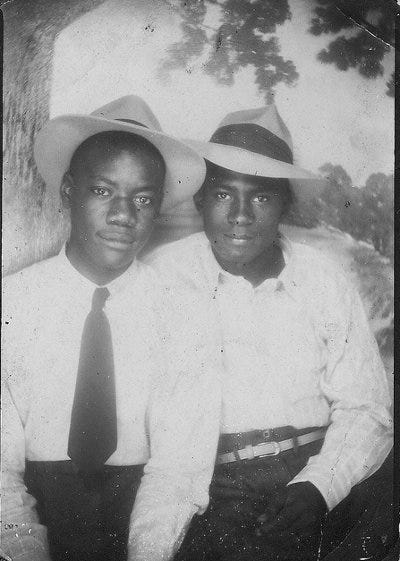
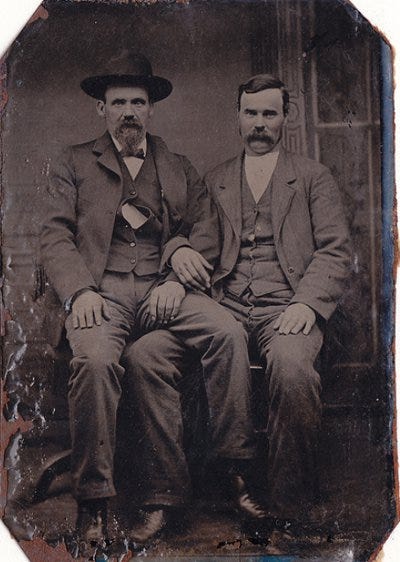
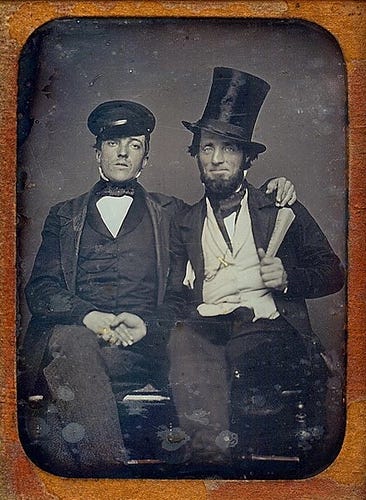
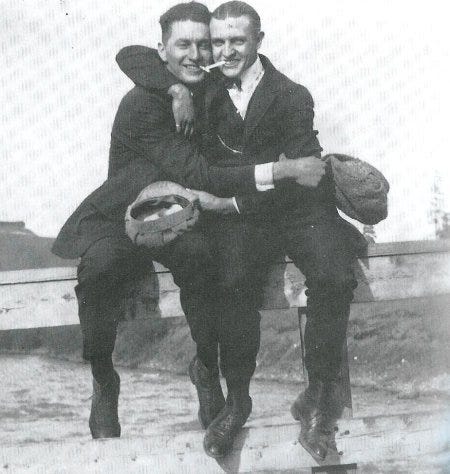

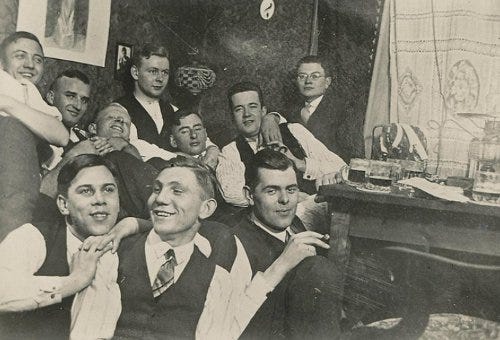
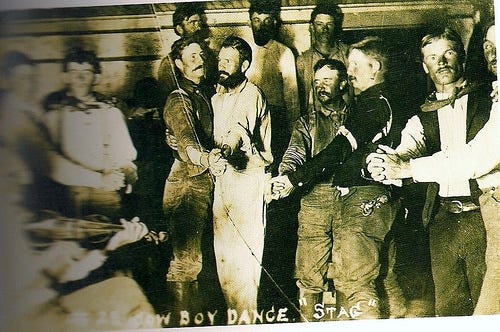
- ^
Male hand-holding never stopped being common in many non-western cultures (also see “Why Arab Men Hold Hands”)
Love this! Not sure if it will win out in the battle arena of EA cause areas, but cultivating deep friendships should definitely be a top personal priority if you care about your happiness.
Relatedly, one way to have better friendships is to make them location-independent, given how most people move so much nowadays. I’ve managed to maintain very close friendships with a lot of friends despite moving a lot, and here’s a short article I wrote about how to do it.
The 80⁄20 of it is to set up regular calls. If you have to organize a hangout each time, it will fizzle out. Make it the strong default.
I’d also add that if you want to have a good romantic relationship, it’s important to maintain good friendships. Putting all of your emotional needs onto one person leads to all sorts of problems. It also distorts your epistemics.
Glad you enjoyed it!
great point re: friends and epistemics. Also makes me think of people who get rich and famous (cough cough SBF cough cough) and become surrounded by yes-men and yes-women instead of friends who can call them out on their bullshit.
I love this post.
BTW, note that there have been two entries on closely related themes for the Cause Exploration Prize: here and here.
I think it is curious that effective altruism doesn’t talk more about friendships or, more broadly, relationships. As far as I understand, relationships are a key determinant of happiness. Also, relationships are one of the first things that come to mind when objective list theorists try to explain to hedonists what might matter in addition to happiness. Relationships thus seem important.
They also seems neglected: I can remember few deliberate policy interventions aimed at promoting good relationships. It might be such a cross-cutting and vague issue that it simply didn’t occur to many that the broad goal of promoting good relationships merits intense attention.
It’s a bit harder to see how it’s tractable.
One obvious tangible solution: legalizing dense housing.
On top of all the ecological, economic, and health reasons why we already need to do that, low-density suburbia puts physical distance between everyone, preventing us from forming relationships. We could place special emphasis on housing projects that include communal hangout areas/recreation facilities, as well as old-fashioned community centers.
I agree dense housing would help. Another idea is more group houses. It seems that there’s an excess of big houses in the US right now: https://www.wsj.com/articles/a-growing-problem-in-real-estate-too-many-too-big-houses-11553181782
More thoughts on roommates as a solution for loneliness in this post I wrote: How to Make Billions of Dollars Reducing Loneliness. (Have learned more about the topic since writing that post; can share if people are interested)
Thanks!
“It’s a bit harder to see how it’s tractable. ”
Yeah that’s the hard one, did the best I could here but obviously most of my suggestions are not super practical/realistic.
I would be super-keen on reading more essays exploring friendship from a well-being/making-the-world-a-better-place point-of-view, and I do think there is something to say there with regards to community building, too!
In any case, I found this post to be a thoughtful reminder for my personal goals with regards to relationships. And thanks for making me laugh! Not something I expect from an ordinary Tuesday evening *hat off*.
haha cheers to that, friend!
The concept of “found family” or “chosen family” is a common concept among LGBT people, who are more likely than non-LGBT people to be estranged from their families of origin. This concept elevates important relationships beyond the word “friend”, which often doesn’t do enough to convey the love and mutual dependence that exists in these relationships.
Relatedly, the terms “queerplatonic partner” or “platonic life partner” can emphasize the seriousness of a relationship more than the term “best friend” might.
Polyamory also offers a path toward more close attachments, and not just of the romantic or sexual kind. If someone is your metamour — your partner’s partner — that can put you on the fast track to close friendship. For people with kids, I hear that a polycule can be like a modern replacement for a large extended family, where there are lots of adults around to give kids love and attention.
Many people would say that love is the purpose of life and I think a core insight is that the difference between the different kinds of love — romantic, platonic, queerplatonic, or familial — is not as important as the fact that love exists and it is allowed to express itself. I think compulsory heterosexuality and monogamy often get in the way of that. If people weren’t worried that love and affection with their friends might cross a line into being gay or constitute cheating on their partner, then people would be a lot less inhibited about loving their friends and expressing that love.
Now THIS is truly an orginal post for this forum. Thanks! Enjoyed reading it, and it expanded my thinking!
Like the others, I loveed this post. let’s be friends ;)
I wonder how much of this “decline of friendship” phenomenon is related to culture, region, income, education and generation. My tentative hypothesis is that people bond by doing things together in-person; this has become rarer for educated millenial westerners.
Nice article but not a divine topic for me. I may think that friendship is something to care for in the next generations and we really should have a circle of trust with friends, family and romantic partner. Also I would promote a new app for finding friends only, not like a tinder or sex/romance stuff.
Try Bumble BFF :)
What a great post- this was really interesting and we really should place a higher value on everyday friendship, as well as sometimes just valuing common humanity above an overly rational view of future good that might ultimately fail by dismissing some important human factors as trivial. And I’m definitely up for a friendship religion too. (Ok, I suppose that’s technically the Quakers already, but I know what you mean!)
Also, you’re a great writer and just come across as really personable and entertaining. I’m going to be slightly disappointed whenever a serious discussion of longtermism on here doesn’t also include at least one Saweetie reference now!